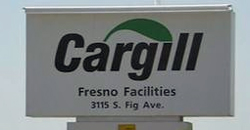 Last Friday Tesla made a big battery storage and product announcement that is changing the landscape of renewable energy storage. The technology is already being tested by the beef industry. Cargill and Pacific Gas & Electric (PG&E) will be installing the technology and Cargill’s Fresno, California beef processing facility. According to Tesla, the technology will reduce energy costs by storing electricity at off-peak times for use during peak times.
Last Friday Tesla made a big battery storage and product announcement that is changing the landscape of renewable energy storage. The technology is already being tested by the beef industry. Cargill and Pacific Gas & Electric (PG&E) will be installing the technology and Cargill’s Fresno, California beef processing facility. According to Tesla, the technology will reduce energy costs by storing electricity at off-peak times for use during peak times.
In total, the Tesla batteries have a 1 megawatt capacity that will be charged daily from the existing PG&E electricity grid system during off-peak hours, when electricity rates are lowest. The electricity stored in the batteries will then be used when rates are the highest each day during peak use times. By doing so, Cargill is reducing its contribution to the daily state power peak, when less environmentally friendly electricity generation might otherwise be required to meet demand.
Electric utility cost savings are estimated to be more than $100,000 annually. As the first large-scale battery installation at a Cargill meat processing facility, the company hopes to learn from this project for future potential use of this technology at its plants around the world.
“Tesla Energy Storage is another example of our willingness to employ new and different concepts for reducing our environmental footprint in ways that benefit the community and our beef business,” said Jon Nash, Cargill’s beef plant general manager at Fresno. “We understand that while we produce nourishing protein for millions of people on the West Coast, it is important for us to do so as responsibly as possible. Proper stewardship of the resources required to produce food is crucial to the ongoing success of our business and is important to current and future generations as the world’s population increases from more than 7 billion people today to more than 9 billion in 2050.”
In recent years, Cargill has been a global leader early adoption of new technology to improve its environmental footprint at Fresno. In 2013, the company worked with a third party to install a solar water heating system on the roof of the beef plant’s main building, resulting in a reduction of the facility’s use of natural gas while also reducing its cost to heat water for food safety and plant sanitation purposes. Years earlier, the plant installed a methane gas recovery system for its wastewater pond, which captures this greenhouse gas for use as a fuel source to heat boilers. Water from the boilers is used for daily plant sanitation. Using this system eliminates greenhouse gas from being released into the atmosphere. Additionally, the plant’s water use has been significantly lowered through an ongoing program of reduction and reuse.
